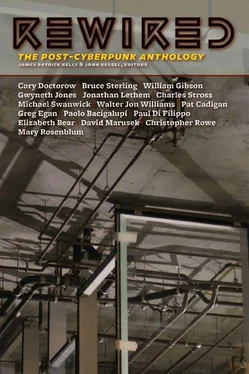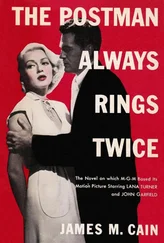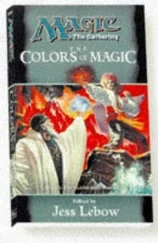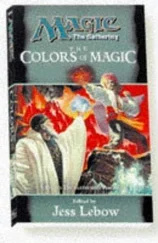singular
The stories in this collection are too various for us to draw a tidy summary of what twenty-first-century cyberpunk is about, nor do we see the profit in it. However, so many of them imply or actually explore a posthuman future that we would be remiss if we failed to point out that a logical consequence of much of cyberpunk extrapolation is the singularity. Vernor Vinge, by no means a cyberpunk, although highly respected by them, first proposed the notion of a technological singularity in 1993. Briefly, he contemplates a moment in history in which runaway technology causes a change “comparable to the rise of human life on Earth. The precise cause of this change is the imminent creation by technology of entities with greater-than-human intelligence.” Vinge speculates this change may come through artificial intelligence, through computer/human interfaces, or through biological modification of the human genome. After this point, human history will end.
One of the obsessions of PCP fiction is to explore the edges of this “end” of history, and if possible, to see beyond it.
form
So far we have spoken of cyberpunk primarily in terms of content, and CP was indeed sparked by an attempt to bring content into science fiction that was being ignored by the sf of the early 1980s.
But part of the force of Cheap Truth was also the aggressiveness of its anti-art stance. Vincent Omniaveritas had little use for the pieties of literary culture and traditional values of well-made fiction. A lot of early CP gained verve from a conscious rejection of the New Wave and the New Wave’s reaching after high modernism’s literary pretensions.
Whereas the New Wave brought stories like, for instance, Philip José Farmer’s “Riders of the Purple Wage” and Brian Aldiss’s Barefoot in the Head that drafted Joycean stream of consciousness into science fiction contexts, Cheap Truth mocked science fiction writers who too obviously adopted literary approaches. But CP was just as self-consciously aware of its ancestors. Where humanist writers might claim Walter M. Miller, Jr., and Ursula K. Le Guin as theirs, CP called on Alfred Bester and William S. Burroughs. Both sides claimed J. G. Ballard. Both sides, consciously or not, were expressions of postmodernism.
In abandoning “well made story values” in favor of oddness, visionary speculation, and the breaking of realist codes, CP was expressing a postmodern sensibility. Literary critics like Larry McCaffery, who edited one of the earliest critical books on cyberpunk, Storming the Reality Studio , recognized the postmodern underpinnings of CP. What the critics saw in cyberpunk was not always in accord with the Cheap Truth party line, but they were right in observing that science fiction puts quotes around the word “reality.” Science fiction is “pre-deconstructed” through the ways that writers consciously encode information that must be read out of the work. In much cyberpunk, no matter how grim, there was a sense of play. Play with content — ideas, technological developments, extrapolations — but also with genre tropes, expectations built up over generations of pulp science fiction since Hugo Gernsback started Amazing Stories .
As PCP writers began to react to and incorporate CP visions, the urge to playfulness grew. Perhaps the more literary interests of humanist science fiction writers had an influence. Or maybe the writers who were never part of the Movement with a capital M no longer felt bound to foment CP’S revolution. Twenty minutes after Vincent Omniaveritas declared victory in Cheap Truth , cyberpunk began to suffer from an inevitable genrefication. The moves that had seemed so daring in 1982 began to look a little stilted. The leathers were by now scuffed and stained; there were scratches on the mirrorshades. The PCP writers had to try something different or else take their places behind the glass in the display cases at the Science Fiction Museum. In the final analysis the CP writers went to war so that the PCP writers could be free to experiment with new forms.
present future
The idea that the physical, mental, and moral structures that most of us live by are radically contingent is at the heart of science fiction. It is evident throughout the history of the form, from H. G. Wells through John W. Campbell through Philip K. Dick and James Tiptree, Jr. It pervades the New Wave, and the feminist science fiction of the 1970s.
All cyberpunks, pre-, classic-, and post-, know this. Perhaps cyberpunk’s greatest contribution to the genre was its uncanny ability to broadcast this science fictional idea to the culture at large. It’s an understanding that, caught in whatever historical moment we write from, is all too easy to forget. We long for permanence, although we grow older with each tick of the clock. We proceed from the assumption that the world is comprehensible, even as we reel from its dizzying complexity. There are no guarantees; tomorrow we maybe uploading ourselves into cyberspace or drowning off the coast of Nevada.
This understanding is the reason why science fiction, if it rises to its own challenge, can be the literature of the twenty-first century. Our hope is that the postcyberpunk fiction here assembled will point the way for the readers and writers to come.
“To shake people awake, one needs the conceptual ability to grip and squeeze. I would hope that my rhetoric was a catalyst — that my remarks will challenge some writers to reassess and refine their own thinking. The cake IS stale and decorations aren’t enough; we need to re-bake everything from scratch. And bake it thoroughly this time — not half-bake it. People should not be afraid to undertake this work. It’s necessary. It’s the karma of our generation in SF.”
— Sterling to Kessel, 22 August 1986
Sterling-Kessel Correspondence
IN THE WAKE of the publication of Neuromancer in 1984 there was a lot of talk about something called “cyberpunk” and a scurrilous fanzine called Cheap Truth , which apparently (I had never seen a copy) had been taking potshots at a number of writers I admired. In the spring of 1985, I wrote a letter to Bruce Sterling asking what all the fuss was about. Did he really detest the kind of fiction I liked as much as I had heard?
Well, yes…he did, sort of.
The correspondence got out of hand. For several years we hammered at each other back and forth through the postal service (this was before the Internet took off). Bruce’s energy was immense, his fertility of imagination imposing, his conviction of his own rightness daunting. I had my own moments. It was the most stimulating conversation of my writing career, and given my age and who I am today, I don’t think (to my regret) that it will ever come again.
As a means of giving a context to the stories collected here, and as a window into some of the thinking that went on behind at least one of the originators of the form, and the reactions of one of it readers, we have scattered brief quotes and exchanges from these letters through the anthology.
Our sincere thanks to Bruce for allowing us to quote from this correspondence.
— John Kessel
Bruce Sterling
Bicycle Repairman
Accompanying CP’S fascination with the “street” came the assumption that, outside of middle-class social structures, new things can be done. Here Chairman Bruce himself observes that the middle class exerts its pull and the outsiders move toward the ordinary. Ten years after the conclusion of this story Lyle will be running a business and Deep Eddy will be a media commentator, both married (and probably divorced) with children.
Читать дальше












